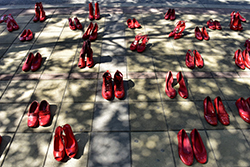Hotline: +381 61 63 84 071
NGO Atina: Women victims of trafficking at high risk of femicide

Despite numerous campaigns aimed at its suppression, human trafficking still represents one of the greatest issues of not only Serbia, but the whole world. Speaking of her experience in dealing with women who survived human trafficking, Sanja Kandic from “Atina” points out that they had previously been victims of violence, and that they were not recognized by the system at all. “Consequently, this leads to the fact that, as victims, they are invisible which means that the femicide itself is invisible. Women who have survived human trafficking must, after that, fight for their lives,” Kandic emphasizes, explaining that many of them experience mental death.
“Human trafficking itself implies elimination of freedom and integrity. This is the first aspect we encounter. Life is killed in these women; you have a person in front of you who does not perceive herself as a living being. Unfortunately, in my work I had a situation where, despite the support provided, the end result was fatal. Consequences are physical, psychological, and it is very difficult to deal with them - both with, and particularly without, adequate support,” Kandic said, adding that violence must not have racial and ethnic affiliation, and that it cannot be attributed to a tradition of a society. She cited an example of a child from a migrant family who, despite the traditional understanding of her own environment, managed to resist domestic violence.
“It was a case of attempted ‘honor killing’. We provided support to a 16-year-old girl who resisted violence by reporting a family member. Her closest ones believed she must be killed because she had embarrassed them and ruined their reputation. There was an attempted murder, they tried to strangle her however she managed to escape. Later, it was the first case of this kind that was prosecuted as an attempted murder,” Kandic explains.
Sanja Kandic from NGO Atina spoke on May 17 at a press conference on the occasion of May 18 – Women Violence Victims’ National Remembrance Day. At the initiative of the Women against Violence Network, the Government of the Republic of Serbia proclaimed this day in 2017.
A proposal for the establishment of Women Violence Victims’ National Remembrance Day was referred by the Deputy Prime Minister and the President of the Coordination Body for Gender Equality, Zorana Mihajlovic. The proposal was accompanied by 8,000 signatures of citizens, gathered through the actions of 35 civil society organizations in 25 cities and municipalities in Serbia. The initiative to declare May 18 the Women Violence Victims’ National Remembrance Day was supported by the signatures of the victims' families, government ministers, deputies, municipal councilors, mayors, representatives of Independent state institutions. Citizens of the Republic of Serbia provided the greatest support to the petition.

On the plateau in front of the Government of the Republic of Serbia on May 18, 2017, 40 pairs of women's shoes were placed in memory of the murdered women (photographer Marija Jankovic).
On that occasion, a press conference was held. Speakers and topics of the conference:
Vedrana Lacmanovic, Autonomous Women's Center: The number and characteristics of femicide in Serbia.
Vanja Macanovic, Autonomous Women's Center: How amendments to the Criminal Code will affect the punishment of femicide perpetrators.
Sanja Kandic, Atina – citizens’ association for combating trafficking in human beings and all forms of gender-based violence: Women victims of trafficking at high risk of femicide.
Vesna Nikolic-Ristanovic, Victimology Society of Serbia: Presentation of the Femicide project throughout Europe.
A joint comment of all the conference speakers was that there are still no results in combating femicide, which marked the Women Violence Victims’ National Remembrance Day.
Since the beginning of 2019, eight women have been murdered in cases of domestic violence in Serbia, two of whom had reported violence previously and sought protection from competent institutions, as stated today at the press conference of the Victimology Society of Serbia.
Data suggests that murderers of women are mainly their emotional partners, husbands, who most commonly commit this crime with a knife, or a firearm. The consequences of domestic violence, which results in a fatal outcome for a female parent, have caused that since 2010 more than 400 children in Serbia have been left without a mother.
“We have been monitoring the murders of women in the context of domestic violence for more than 10 years. The data we have speaks of the fewer number of murdered women compared to the actual number, as a significant percentage of murders did not reach the media,” said Vedrana Lacmanovic from the Autonomous Women's Center.
According to the media, every sixth murdered woman had addressed one of the competent institutions for protection and assistance before she was killed.
Per the assessment of Vedrana Lacmanovic, this shows the indecision and failure of state institutions to stop the crime despite numerous laws and measures.
“Gaps often occur in the exchange of information between institutions, after the victims report violence. For example, it happens that the center for social work fails to inform the police, or a health institution, in order to provide adequate assistance to these women,” Lacmanovic said, adding that another issue lies in the condition that the victim of violence must be claimant for protection.
“If they refuse to initiate the proceedings themselves, they cannot be protected. Although representatives of institutions, in this case, should act ex officio,” underlines Lacmanovic.
According to Vanja Macanovic from the Autonomous Women's Center, announced amendments to the Criminal Code that foresee life sentence for the most serious crimes could have a negative impact on the protection of women. She points out that it is not clear whether the adoption of this law will completely eliminate the possibility of prison sentences to 30 or 40 years.
“Our fear is that judges, in terms of women's murder, will decide on a sentence of 20 years in prison, which would result in killers being free sooner than they should. We do not have many court proceedings on the murder of women. Only in three out of eight cases have judges passed final verdicts of 30-40 years in prison,” Macanovic said, citing the court in Sabac, where the first-instance verdict for a murder of a woman and a child was 20 years in prison.
“The Prosecution appealed, and the Appellate Court in Novi Sad changed the verdict to 30 years. The appeal took into account the fact that it was a brutal murder, bearing in mind that the mother and son fled from the killer barefoot in the snow. If the new law is adopted, it is unlikely that the appeal would change the sentence of 20 years to life imprisonment,” warns Macanovic.
Vesna Nikolic-Ristanovic, a representative of the Victimology Society of Serbia, also believes that the announced changes could significantly impede the protection of victims of violence.
“Bearing in mind that courts mostly deal solely with violence, without interpreting the circumstances that led to it, those women who kill the perpetrators in a state of complete helplessness, for example in their sleep, can be sentenced to a life imprisonment,” said Nikolic-Ristanovic.
Women Violence Victims’ National Remembrance Day is commemorated since 2017. At the initiative of the Women against Violence Network, a proposal was submitted by the Deputy Prime Minister and the President of the Coordination Body for Gender Equality, Zorana Mihajlovic. The proposal was accompanied by 8,000 signatures of citizens, gathered through the actions of 35 civil society organizations in 25 cities and municipalities in Serbia. The initiative was supported by the signatures of the victims' families, government ministers, deputies, municipal councilors, mayors, representatives of Independent state institutions.
According to the Victimology Society of Serbia, the reason for marking this date as the Women Violence Victims’ National Remembrance Day were the murders that took place in 2015, when, between May 16 and 18, seven women lost their lives in Velika Plana, Kanjiza, Cacak, and Belgrade.
Photographs from the conference can be found via the link: http://www.atina.org.rs/sr/ug-atina-%C5%BEene-%C5%BErtve-trgovine-ljudim...
The original text can be found at the following link: http://www.mc.rs/mc_press_centar/dogadjaji.4.html?eventId=11148












 FACEBOOK
FACEBOOK TWITTER
TWITTER YOUTUBE
YOUTUBE